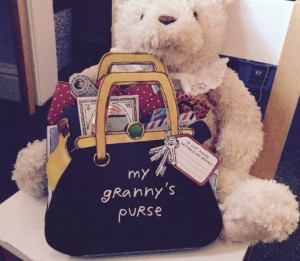 A fellow grandmother gave me an amusing gift for Christmas this year. Shaped like an old fashioned handbag and held together with an elastic bungee cord laced through each of the content pages, it is actually a book, with a catchy plot that made both my granddaughter and her mother laugh when I first read it to them.
A fellow grandmother gave me an amusing gift for Christmas this year. Shaped like an old fashioned handbag and held together with an elastic bungee cord laced through each of the content pages, it is actually a book, with a catchy plot that made both my granddaughter and her mother laugh when I first read it to them.
However, there is also a subplot, and after several readings of the story I am finding myself somewhat concerned by that element, which seems to be the trigger that makes readers laugh, at least the first time they encounter it.
The story line consists of pairs of comments made, presumably by a child, reflecting on the views of the two main characters, Granny and Mommy, as the child explores the “contents” of Granny’s purse. In all but one case, they are different from one another. For example:
Our first view of the inside of Granny’s Purse is a collection of photos, breath mints, an address book, and a banana. The child says “My mommy says ‘You should never look in a lady’s purse.'”
“My granny says, ‘Never say never.'”
The second peek inside the purse reveals a mirror in which the child sees his/herself reflected, and a miscellany of perfume, lipstick, nail polish, comb, jewelry and eye makeup. The narrative continues:
“My mommy says, ‘Stop looking in the mirror.'”
“My granny says, “Always look your best!”
This far into the book I was still amused, and my amusement, as I said, continued through the first few readings. However, the repeated disagreements between Mommy and Granny began to wear on me. Is this really how the author sees grandparents? As a foil to the good sense guidelines that parents offer their children? As a relief from good manners?
“Let’s go!” Granny says on a page filled with photos of exotic places, an Amex card and a hotel matchbook. But: “My mommy always says, ‘Sit still, please.'”
And in the realm of healthy eating?
“My mommy says, ‘You are what you eat.'” While, on the same page, surrounded by pictures of chocolate bars, bon bons, lollipops and lifesavers, Granny says, “Sweets for the sweet!.”
Reading the book with my granddaughter for the eighth or ninth time, my mind suddenly flashed back to an Easter Sunday long ago, when her own mother was about four or five and had recently developed what seemed like a constant craving for sugar. I was in my Earth Mother stage, and had asked my parents and in-laws to please respect my efforts to downplay candy in our lives, but when the Easter baskets arrived along with the grandparents that day, my parents’ basket was overflowing with candy eggs, chocolate bunnies, and miscellaneous chewy and artificially colored sweets. That I can remember my disappointment and frustration nearly 40 years later is significant. It wasn’t just the sugar, but the feeling that my parenting was being questioned, even undermined, by that gesture.
My mother-in-law, however, had listened to my request and had filled her Easter basket with art supplies, tiny little pasteboard boxes with plastic animals inside, and bright new books. My relief and gratitude for that gift (which turned out to be my daughter’s favorite basket, by the way), and the validation of me as a parent that it represented, has also stayed with me all these years.
I’m not suggesting that grandparents should agree with everything their children do or say about raising children; only that by setting ourselves up as a foil to their beliefs does no one any good. Of course we enjoy the freedom of being able to hand back our grandchildren after a tiring day at the playground or the aquarium, and we do get the opportunity to relax bedtimes or mealtime rituals a little, but I believe strongly that on the whole we should reflect the same values the parents are attempting to instil in their children, and support their efforts to do so. If my daughter asks me to make sure her daughter finishes her afternoon snacks by 3:30 to encourage her to be hungry at mealtime, it really serves no good purpose for me to offer an ice cream at four o’clock. And if I’m asked to limit screen time during her visit so the family may watch a video in the evening without going over the guideline number of minutes, again, it seems to me that I should comply, not discuss, argue, or simply ignore the request.
How do you feel about this? Do you think that grandparents should support their children’s rules, even if they do not agree with them? Do you think we should strive to change our children’s minds, to encourage them to parent more as we did, or more as we believe today if we have learned from our own shortcomings? I’d love to hear from you. Leave a comment below and we can start a conversation!
In the future, when my little Bean requests a reading of Granny’s Purse, I think I will interject an opinion or two, or ask a question about these pairs of disparate comments to see how she sees her own mommy and grandma in the story. And perhaps it can serve as as reminder to me that we are parenting this child together, not in competition. Yes, we may have different views, but our ultimate goal is a happy, well adjusted child. Mommy gets to make the rules this time. Grandma had her chance.
Share this post




Barbara,
I really like your interpretation of the book’s intent. Definitely parents and grandparents have different lives, different interests, different personalities and dispositions as you say, and the view you present is far more positive than mine. Thanks for sharing your point of view.
One of the things I remember most about my grandmothers was that they were different one from the other and different from my mother as well. One grandmother told stories and had treasure troves of buttons and rick rack and threads and yarns and willingly let me sort and compare by the hour. The other grandmother was much more formal and told different stories but was more inclined to talk about rules and ways of doing things. Although clear with rules, my mom brought out fingerprints, nature walks, books, and imaginative play.
So perhaps the intent of the Granny book is to show children that while grandmas can be caregivers and seem like an extension of mothers, they really have different interests, personalities, and dispositions to share with grandchildren which allows children to know them as individuals that care and love them.